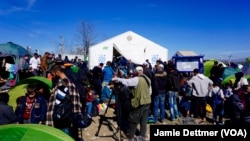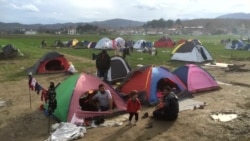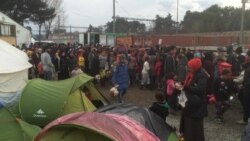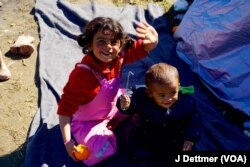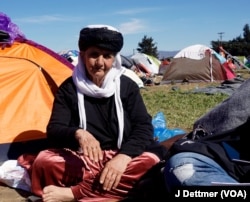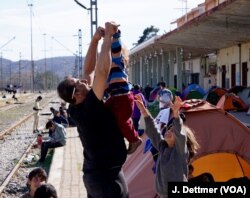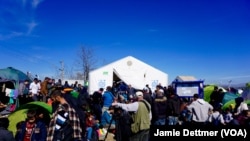The bearded, gray-haired electrical engineer from the Iraqi city of Mosul looked distraught.
“Will the Macedonians even let us pass, if they open the border,” he asked sitting cross-legged in front of a small tent that he, his wife, son and daughter jokingly refer to as "home."
He has only just learned that the Macedonians, who are allowing only a daily trickle of refugees to cross the border, are turning back Iraqis and Syrians who have spent more than 30 days in Turkey or Greece, or any other country considered “safe.”
On Friday, Macedonian authorities allowed 180 refugees to enter out of the more than 13,000 refugees and migrants camped out by coils of razor-wire fencing, along rail tracks and in muddy fields. That is a decrease from the 280 the Macedonians accepted Thursday.
Variety of ethnic groups
According to U.N. officials and relief workers here, more than 70 percent of the asylum-seekers at Idomeni, a small village with a population of 154, are Syrians and Iraqis. The rest are Afghans and Pakistanis, or mainly economic migrants from North Africa.
WATCH: Related video of refugees at Greek camp
Ghanim and his family fled Mosul two years ago, a month after Islamic State militants overran the city and terrified locals with Draconian rules and the slaughter of opponents, Shi’ites and members of minority religious groups.
They lived in fear, avoiding the jihadists as best they could before fleeing to the Iraqi Kurdistan capital of Irbil.
Life was expensive in Irbil and with no job prospects they moved on to Turkey where they stayed for nine months as they raised money and plotted carefully their flight to Germany, where they have relatives.
Last month, they risked a dangerous Aegean Sea crossing, thinking that would be the worst part of their passage to Germany, only to arrive at Idomeni the day after Macedonia announced the closure of the border. They are fearful their dreams of a better, safer life will be dashed.
Stalled career dreams
Swinging between frustration and fear, Ghanim’s daughter Samar wails: “What will become of us?” The ambitious 20-year-old speaks four languages – including English – and is desperate to return to formal education, hoping one day to become a doctor.
“I have lost two years,” she frets as she chews on some bread and processed cheese. “The worst part of the journey is right now – the sea-crossing was easy. I am really scared about what is happening,” she adds with a frown.
Samar and her father aren’t the only refugees at Idomeni trying to keep up with changes in admittance rules Macedonia and other Balkan countries are coming up with on a daily basis and often not even announcing them, flouting efforts by Brussels to get European Union member states back to applying “common rules.”
Austrian restrictions
Austrian Chancellor Werner Faymann remains insistent that his country will stay firm on border restrictions choking the flow of migrants along the Balkan route to West Europe that it imposed last month.
Austria’s decision to allow only 3,200 asylum-seekers to pass through each day triggered the closing of borders in the Balkans – or severe clampdowns on the numbers that would be allowed to transit on their way to Germany and other northern European countries.
Refugees at Idomeni say the restrictions are surreal, considering none of them plans on staying in the Balkans or Austria. “We just want to go Germany,” Samar said.
In-mid February Balkan authorities started to reject, although not uniformly, Syrians and Iraqis who breached the 30-day rule, a policy agreed to at a February 18 meeting in the Croat capital of Zagreb between police officials from Croatia, Austria, Slovenia, Serbia and Macedonia – and approved apparently by their governments.
The rule change, Balkan officials said, is aimed at reducing to “the greatest possible extent the migration flow along the Western Balkans.”
It is a flow they say is causing chaos and they blame Greece for waving through refugees and migrants.
The 30-day rule change joins a series of other ones, sometimes agreed upon collectively by the EU, other times decided arbitrarily by individual states or groups of countries.
Special problems for Afghans
Twelve days ago, Afghans lost their war refugee status, being deemed instead economic migrants by the Macedonians. Aid groups complained that Macedonian border guards enforced that rule brutally, kicking Afghan refugees – women and children among them – for refusing to board buses that would return them to Athens.
Thousands of Afghans are now stranded in Greece – nearly a quarter of them estimated by humanitarian groups to be under the age of 18.
WATCH: Thousands of refugees stalled at Greece-Macedonia border
Among them a decision by Macedonian and other Balkan authorities last week that they will deny entry to Syrian and Iraqi asylum-seekers who say they want to reach Western Europe for any reason other than to escape war.
If they mention they want to complete their education or hope to reunite with family members or fled their countries to avoid military recruitment, they will be turned back. Aid workers warn refugees can easily be tricked into giving any of those reasons, even if they are ancillary ones.
On Saturday, and without any announcement, Macedonian officials told some refugees that Syrians from Damascus or Iraqis from Baghdad would also be blocked from journeying further.
No rationale for the change was offered, despite the fact the Damascus suburbs have been heavily hit in Syria’s civil war and have seen some of the fiercest bombardments of the conflict, including chemical warfare attacks.
'Arbitrary, unilateral decisions'
The rule changes have provoked the International Rescue Committee (IRC) to condemn “arbitrary, unilateral decisions by individual states threatening to cause serious humanitarian consequences for desperate refugees fleeing from war and persecution.”
IRC and other humanitarian and international rights groups have urged European states to observe fair and thorough status determination procedures based on refugees’ individual circumstances.
That is not being done at Gevgelija, on the Macedonian side of the border opposite from Idomeni, say refugees and aid workers.
The few asylum-seekers being let across are receiving perfunctory 30-minute interviews by police officers from Austria and the Czech Republic assisted by Macedonian counterparts. Interpreters are present, but those 30 minutes will decide the likely lifetime fate of refugees with rejection, meaning immediate deportation to Greece.
Memories of homeland
Jalila, a 79-year-old Yazidi woman who brought with her on her epic journey a small bag of dirt from her farm near Iraqi’s Sinjar would certainly flunk an interview.
She said the only thing keeping her going is the prospect of being reunited with family members in Holland, including her daughter.
A granddaughter has come with her. She raises her arms to the sky cursing the Islamic State militants who forced her to flee.
As she sits awaiting her future on the Greek-Macedonian border she sheds tears for her past and for “my beautiful farm.” She points up at the olive trees on some nearby hills. “Mine were better,” she says.
Shifting refugee policies
The fate of many of the refugees may well be determined partly at a summit between EU and Turkish leaders in Brussels Monday.
EU leaders are hoping to persuade Turkey to do more to stem the flow of war refugees. If that doesn’t happen, or Austria and its Balkan allies feel it won’t happen, they are expected to push a substitute policy; sealing off Macedonia’s and Bulgaria’s borders completely with Greece, which would worsen the humanitarian crisis in Greece and upend German Chancellor Angela Merkel’s open-door policy.
But under domestic political pressure, even Merkel’s door isn’t as open as it was last year.
She has said the buildup of refugees and migrants on the Greek-Macedonian border isn't the same as last September when she agreed to let in thousands of asylum-seekers who had piled up in Hungary.
Last week, Merkel said, “There are accommodation possibilities ... in Greece, they should be used by the refugees and she stressed "there is not a right for a refugee to say, 'I want to get asylum in a particular country in the European Union.’ "
Refugees like Abdul from the Syrian city of Homs, who is at Idomeni with his wife and two boys aged 7 and 8, asks why Merkel told Syrians to come and promised a welcome. “Why did they say we could come, then, if they don’t want us?”
They spent three months in Turkey trying to find a boat to cross the Aegean. “God willing, they will let us pass,” he says, as he smokes nervously.
Any decisions reached in Brussels Monday will then have to be approved at a mid-March summit featuring just EU leaders.
Hungarian Premier Viktor Orban, an outspoken critic of Europe admitting any more asylum-seekers, said on state radio Friday, “We have nerve-racking weeks ahead.”
They will be even more nerve-racking for the refugees.
Photo gallery: Idomeni, Greece, refugee camp




